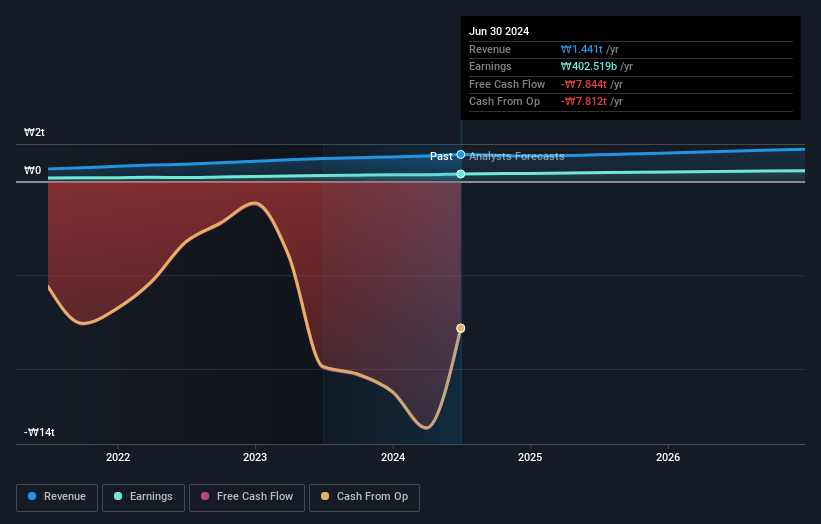- South Korea
- /
- Banks
- /
- KOSE:A323410
KakaoBank Corp. (KRX:323410) stock most popular amongst public companies who own 54%, while individual investors hold 31%

Key Insights
- The considerable ownership by public companies in KakaoBank indicates that they collectively have a greater say in management and business strategy
- 54% of the business is held by the top 2 shareholders
- Institutional ownership in KakaoBank is 15%
To get a sense of who is truly in control of KakaoBank Corp. (KRX:323410), it is important to understand the ownership structure of the business. And the group that holds the biggest piece of the pie are public companies with 54% ownership. Put another way, the group faces the maximum upside potential (or downside risk).
And individual investors on the other hand have a 31% ownership in the company.
Let's delve deeper into each type of owner of KakaoBank, beginning with the chart below.
See our latest analysis for KakaoBank

What Does The Institutional Ownership Tell Us About KakaoBank?
Many institutions measure their performance against an index that approximates the local market. So they usually pay more attention to companies that are included in major indices.
We can see that KakaoBank does have institutional investors; and they hold a good portion of the company's stock. This implies the analysts working for those institutions have looked at the stock and they like it. But just like anyone else, they could be wrong. If multiple institutions change their view on a stock at the same time, you could see the share price drop fast. It's therefore worth looking at KakaoBank's earnings history below. Of course, the future is what really matters.

KakaoBank is not owned by hedge funds. Kakao Corp. is currently the company's largest shareholder with 27% of shares outstanding. In comparison, the second and third largest shareholders hold about 27% and 5.3% of the stock.
A more detailed study of the shareholder registry showed us that 2 of the top shareholders have a considerable amount of ownership in the company, via their 54% stake.
Researching institutional ownership is a good way to gauge and filter a stock's expected performance. The same can be achieved by studying analyst sentiments. There are plenty of analysts covering the stock, so it might be worth seeing what they are forecasting, too.
Insider Ownership Of KakaoBank
The definition of company insiders can be subjective and does vary between jurisdictions. Our data reflects individual insiders, capturing board members at the very least. Company management run the business, but the CEO will answer to the board, even if he or she is a member of it.
Insider ownership is positive when it signals leadership are thinking like the true owners of the company. However, high insider ownership can also give immense power to a small group within the company. This can be negative in some circumstances.
Our data cannot confirm that board members are holding shares personally. Not all jurisdictions have the same rules around disclosing insider ownership, and it is possible we have missed something, here. So you can click here learn more about the CEO.
General Public Ownership
With a 31% ownership, the general public, mostly comprising of individual investors, have some degree of sway over KakaoBank. This size of ownership, while considerable, may not be enough to change company policy if the decision is not in sync with other large shareholders.
Public Company Ownership
It appears to us that public companies own 54% of KakaoBank. We can't be certain but it is quite possible this is a strategic stake. The businesses may be similar, or work together.
Next Steps:
While it is well worth considering the different groups that own a company, there are other factors that are even more important.
I like to dive deeper into how a company has performed in the past. You can find historic revenue and earnings in this detailed graph.
But ultimately it is the future, not the past, that will determine how well the owners of this business will do. Therefore we think it advisable to take a look at this free report showing whether analysts are predicting a brighter future.
NB: Figures in this article are calculated using data from the last twelve months, which refer to the 12-month period ending on the last date of the month the financial statement is dated. This may not be consistent with full year annual report figures.
If you're looking to trade KakaoBank, open an account with the lowest-cost platform trusted by professionals, Interactive Brokers.
With clients in over 200 countries and territories, and access to 160 markets, IBKR lets you trade stocks, options, futures, forex, bonds and funds from a single integrated account.
Enjoy no hidden fees, no account minimums, and FX conversion rates as low as 0.03%, far better than what most brokers offer.
Sponsored ContentValuation is complex, but we're here to simplify it.
Discover if KakaoBank might be undervalued or overvalued with our detailed analysis, featuring fair value estimates, potential risks, dividends, insider trades, and its financial condition.
Access Free AnalysisHave feedback on this article? Concerned about the content? Get in touch with us directly. Alternatively, email editorial-team (at) simplywallst.com.
This article by Simply Wall St is general in nature. We provide commentary based on historical data and analyst forecasts only using an unbiased methodology and our articles are not intended to be financial advice. It does not constitute a recommendation to buy or sell any stock, and does not take account of your objectives, or your financial situation. We aim to bring you long-term focused analysis driven by fundamental data. Note that our analysis may not factor in the latest price-sensitive company announcements or qualitative material. Simply Wall St has no position in any stocks mentioned.
About KOSE:A323410
KakaoBank
An Internet bank, provides banking services through electronic financial transaction method in South Korea.
Proven track record with adequate balance sheet.


